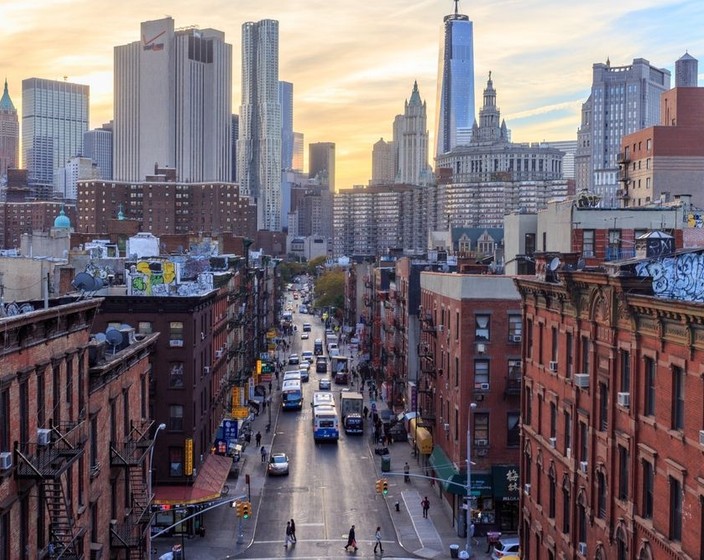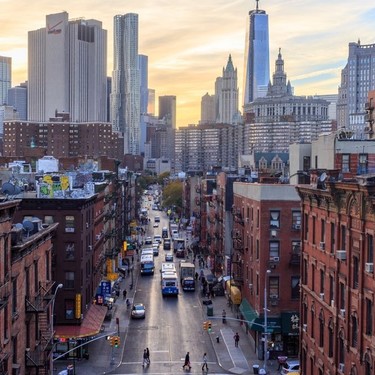Goodbye, New York




Goodbye to the sushi on the corner of East 10th and 1st. It was 2010, I was not yet vegan, cynical, or a person who knew anything at all. I was studying political science at The New School, and until that second night in New York City, I hadn’t eaten many cuisines outside the Italian from my parents’ restaurant. I paid $4.50 for something called a tuna avocado roll and ate it like I’d discovered a long-lost secret.
Goodbye to French Roast on 6th Avenue where, after our Political Spectrum seminar, four of us gathered to eat creme brûlée and admit loneliness. We felt so extravagant, eating a French dessert for dinner because we couldn’t afford both. That next semester, I switched my major to art and creative writing and saw less and less of each of them until we were complete strangers once more. Robin Mookerjee, the professor of that seminar—our first as college freshmen—died a few years later. French Roast closed soon after. I find all of this very sad now, a little trail of deaths connected by sugar.
Goodbye to the produce stand in Harlem where I bought a tie-dyed backpack for $10 and filled it with bananas, apples, berries, and papaya. I’m so free, I thought, walking down 125th. I walked all the way to Battery Park. I hadn’t yet felt the overwhelming desire to shrink myself at all costs.
Goodbye to my first day as a vegan—the day the orthorexia started. In the middle of my 6-hour drawing studio, I went to Valentino’s and bought a pack of homemade strawberry newtons and green kombucha for dinner, which cost $8.50 and would keep me small, healthy. In every restaurant from then on, I would ask for the cheese, cream, milk, or meat to be removed from everything I ordered. My fridge and pantry were pure and compact, a mosaic of produce, puffs, and nuts.
Goodbye to Angelica Kitchen, the original, all-vegan spot up the block from my second apartment. The air smelled of umami, and I never tired of their prominent signage explaining that they were ‘cash only,’ as it benefited the farmers who grew the food customers consumed. Once, while eating a bowl of rice and seaweed, I saw my idol, poet Arianna Reines, also eating a bowl of rice and seaweed. She was speaking intently to the person across from her--another poet perhaps--who, like me, hoped to find artistic success by proxy. When it closed, I had already left the East Village for Gowanus, where I obsessively consumed 80% greens and wrote nothing for three years.
Goodbye to the vegan arepas that Daniel made me in his dorm after cross country practice. Once, he and I ran along the East River Park through a terrible thunderstorm. We stopped 3.5 miles out, having reached a tiny beach near the Brooklyn Bridge, a beach I visited many times thereafter, where I would look back at all that Manhattan and think of my life. Daniel moved to Berlin a year after graduation.
Goodbye to Peacefood Cafe on 11th Street, whose juices, salads, and chickpea fries made being vegan less unsociable. My very last meal there, eaten just a few weeks before I drove across the country to Austin, was a peace bowl with greens and Japanese pumpkin. It reminded me of my long, hard journey with food, with New York--how many years I ordered to starve and not to taste.
Goodbye to Motorino on 12th Street, where the entire block took shelter to eat whatever dough hadn’t perished during Hurricane Sandy. They are the only restaurant to serve Gragnano, a bubbly, chilled red made in Naples, Italy, where my father grew up. We ordered it after my college graduation, my family squeezed around a marble table on a street with too many memories.
Goodbye to my vegan diet, which lasted almost as long as my decade in New York. My endocrinologist, a tough Greek lady with a booming laugh, told me I was dying. My palms were orange and that my thyroid wouldn’t function normally unless I started eating animal protein. I panicked. Who was I without my extremities? My diet, my bones, my big, big city.
Goodbye to the first piece of meat in 16 years: a side of grilled chicken from Purbird in Park Slope, around the corner from my last apartment. I sat alone and ate it slowly, terrified it would kill me or that it wouldn’t. Later, I ran my usual route through Prospect Park, determined to work off the impure food. I shaved five minutes off my time.
Goodbye to the Milk Bar in Park Slope where Will and I went after falling in love. I ordered the half smoked-salmon toast, which came on a piece of sourdough topped with pickled onions, dill, and an egg. It became our Sunday ritual: sleeping late, eating there, wandering the streets of our neighborhood looking for free books. I loved our little life, but I felt drained...All the years of deprivation, pollution, sleeplessness. We talked about leaving.
Goodbye to the slice of Artichoke pizza at 3:30 a.m., the final hour of my going-away party. Pizza in New York City is a sacred institution. That you can get a fresh slice almost 24-hours a day makes “drunk pizza”—eaten between midnight and 4 a.m.—a right of passage, one that took me almost ten years to experience. This, I think, is New York: relinquishing control to whatever is happening right now. New York itself gave me the courage to say goodbye: to restriction, to fear, to the greatest home I’ve ever known.